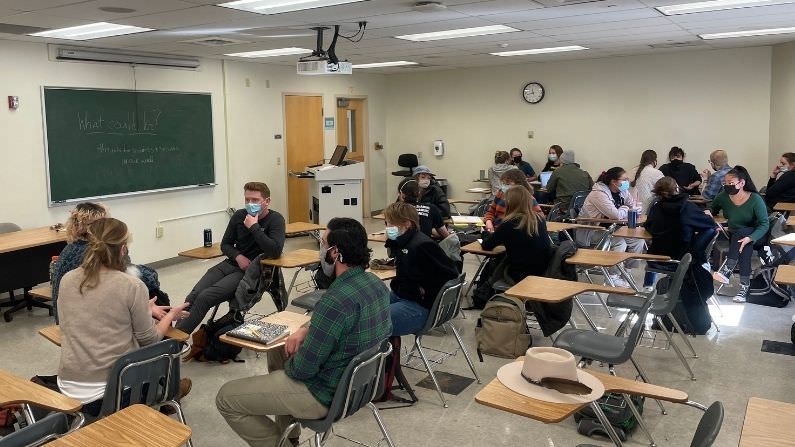This story is part of a collaboration with Rocky Mountain Community Radio focusing on the transition away from fossil fuels across the Mountain West.
Dr. Heidi Steltzer is a professor of environment and sustainability and biology at Fort Lewis College in Durango. This semester, she’s teaching a course on science values and environmental leadership, an upper-division level class that takes a different, more solutions-oriented approach to science.
“This is my dream course,” she said. “This is my dream course because it’s the only course I teach that’s about what couldn’t be for science rather than more the fundamentals and the building blocks and making sure that you have the skills that you need.”
Those skills include examining the ecological effects of climate change and exploring alternative energy systems that move us away from fossil fuels. For Steltzer, teaching about what could be to future environmental leaders is just as important, if more, than the basics of these subjects.
“It’s recognizing where and how much more learning comes from asking questions in where I can pop in fundamentals,” she said. “But we’re not dominated by fundamentals. There’s still so much about the basic biology that we will cover. But we’ll cover it through story. We’ll cover it through questions and what doesn’t get covered. They’ll learn it somewhere else.”
In the first week of class for the spring semester, roughly 20 students filled the classroom as small breakout groups were formed to discuss what the current role is for scientists and science in society today. Ashley Jorgenson is a senior majoring in environmental sciences at the college. She said scientists’ biggest role is to make a difference, especially when it comes to fossil fuels.
“We have the technology there to make changes,” Jorgenson said. “Like, my first thought was like energy sources. And like solar panels have so much potential. But they’re not being implemented anywhere. And so I think that’s on a policy level for sure. Because individuals can take action. And I think it’s a mix of both.”
Jorgensen said she appreciates the more philosophical approach to science and recognizes her role as a future environmental leader to help make a difference. Jorgenson feels that learning how to make critical changes about fossil fuels on a policy level is our best hope. But for Steltzer, working and learning from the students is what helps her become a better professor and a scientist.
“I learned as much if not more from students than anything I’ve ever taught them,” she said. “And so, when I hear that phrase ‘teaching solutions,’ I think if we can grow out of the space of what we see as the norm and sort of our first thought about what teaching is, and recognize it’s a community thing. Because I have my biases, you have your biases. We all have those experiences that have influenced us, for better and for worse, and where and how do we step into a space open to hearing? How would you solve something?”
This course’s more theoretical approach is just one example of many in how education will play a crucial role in transitioning away from fossil fuels as they educate a new generation of environmental leaders.






